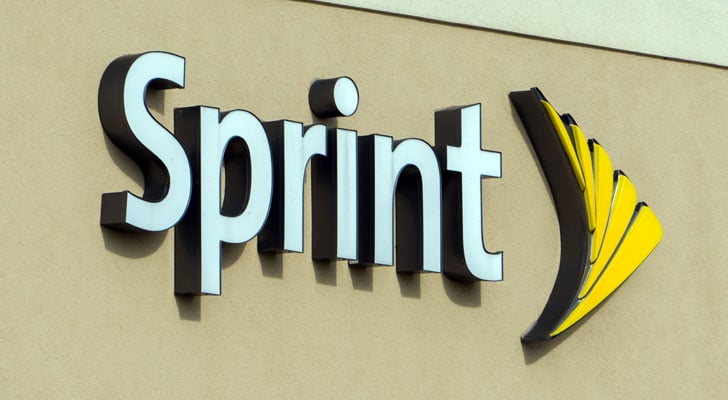Shares in T-Mobile (NASDAQ:TMUS) and Sprint (NYSE:S) barely budged on word that regulators have “stopped the clock” on their merger. The original deal between the two, signed in April, valued Sprint stock at about $6.50 per share, but it is an all-stock transaction, about 1/10th of a T-Mobile stock share (specifically 0.10256) for each Sprint stock share.
This implies the deal currently has a value of $6.70 per S share, based on T-Mobile’s opening price of $65.91 per share — A more than 10% premium to Sprint’s $6.03 per share opening price. But, then, Sprint shareholders must wait for that premium, and it is not yet locked-in.
The Federal Communications Commission had initially given itself 180 days, until late October, to review the merger. The pause announced yesterday means a final agreement could come in November, December or not at all.
AT&T’s Big Silence
T-Mobile’s biggest competitors, AT&T (NYSE:T) and Verizon Communications (NYSE:VZ), have put minimal public lobbying weight behind stopping the merger. The “big two” of the wireless business each has about one-third of the market. T-Mobile, Sprint and a host of smaller companies share the other third.
AT&T would be the biggest loser after the merger, with one-third of customers in a recent survey saying they might switch. T-Mobile looks set to copy AT&T’s TV-based strategy on the cheap, having bought Layer3 in January, with plans to take on not only AT&T Wireless, but its U-Verse cable service.
For the record AT&T says it “won’t contest” the merger, but network neutrality supporters like Tim Wu are still fighting it. Most of AT&T’s money seems to be going to securing its flanks,
battling against net neutrality and trying to stop sharing of its lines with small ISPs.
T-Mobile, meanwhile, has lined up its re-sellers to lobby for the deal’s approval. T-Mobile stock is trading higher than they were before the announcement.
AT&T lobbying is both above and below the surface of the news, however. My guess is the pause drew smiles in Dallas.
The Risk for Sprint
The bigger risk is for Sprint stock. S had been trading as low as $5.06 before the deal’s annoucnment.
Once a merger is announced, time often stops on the company being acquired. Hiring freezes, especially for executives, and strategy is subsumed into the company that’s buying them. Unwinding this can be very expensive.
Sprint argues its ability to support 5G service is at stake, calling it essential to providing meaningful competition for the AT&T-Verizon duopoly. For their part, unions opposed to the merger say it would cost 28,000 jobs — most of them at Sprint. Failure to complete the deal means those people stay on, but how happily?
Sprint has been focused on profitability, not market share, and its market share was down to just 11% in the second quarter, with 40% fewer subscribers than T-Mobile.
Softbank (OTCMKTS:SFTBY) owns over 80% of Sprint and would hold 27% of the merged company, but its founder, Masayoshi Son, who once dreamt of a single global wireless operation, is now focused entirely on his Vision Fund, a $100 billion venture fund he administers. He may have neither the bandwidth nor the capital to put into Sprint should the merger fail.
The Bottom Line for Sprint Stock
While the capital gains from this merger mostly go to Sprint shareholders, the risks of failure are also on them.
Failure to complete the deal will leave Sprint without a strategy and pressed by deadlines for enabling 5G service against well-heeled competitors.
It is still likely the deal will go through, and Sprint stock rose in early trade September 12 — showing that investors believing the pause is temporary.
But the risk in the merger has just gone up.
Dana Blankenhorn is a financial and technology journalist. He is the author of a new mystery thriller, The Reluctant Detective Finds Her Family, available now at the Amazon Kindle store. Write him at danablankenhorn@gmail.com or follow him on Twitter at @danablankenhorn. As of this writing he owned shares in T.

